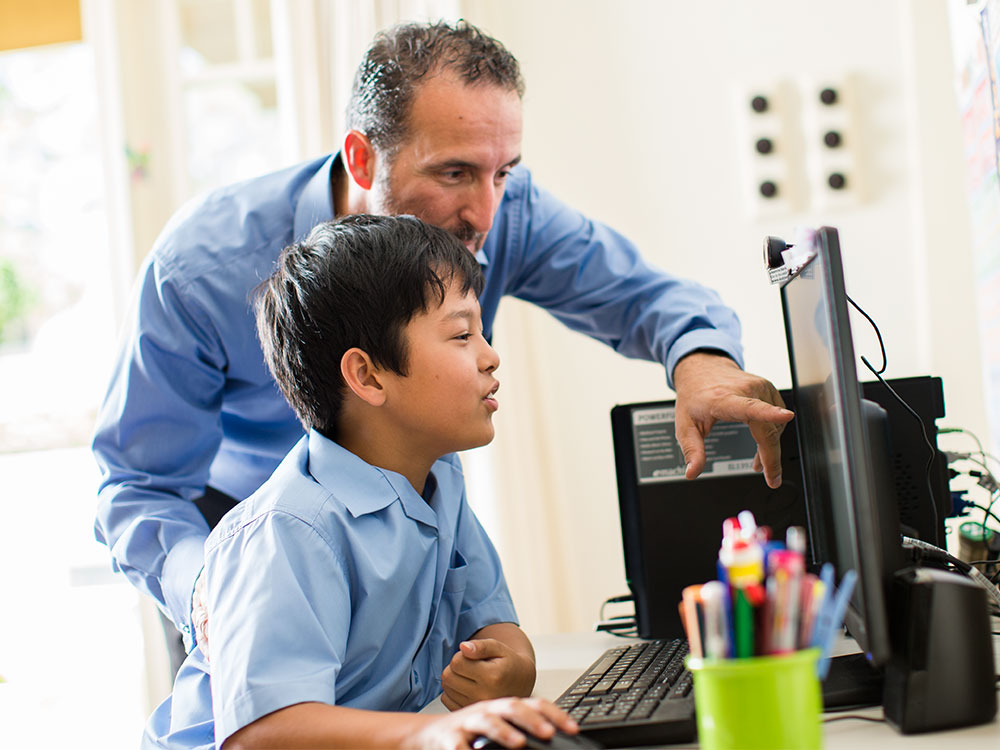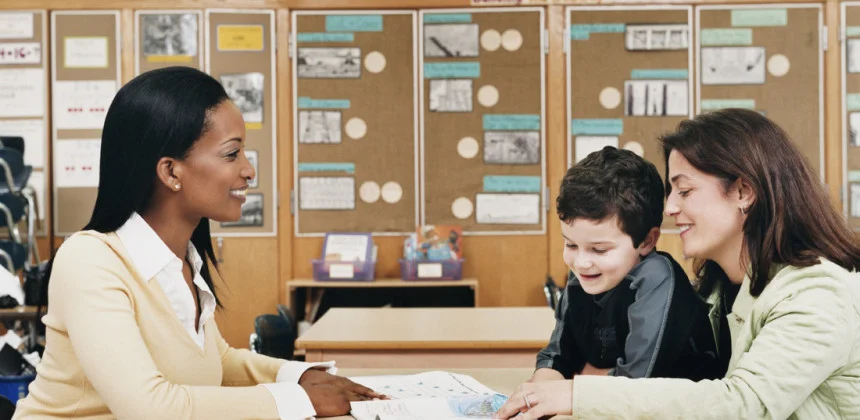Essential Tips for Safeguarding Kids Online
To keep your kids safe online, start by setting clear rules together and talking openly about online risks. Use parental controls, monitor their activities, and teach them about online safety. Make sure they understand how to responsibly use social media and protect their personal information. Lastly, help them develop critical thinking skills to evaluate online content. Taking these steps will help safeguard your children in the digital world.
Key Takeaways
- Set parental controls on devices to limit access.
- Educate children on online risks and safe behavior.
- Monitor online activities discreetly for insights.
- Establish clear guidelines and boundaries for internet use.
- Encourage critical thinking when interacting online.
Establish Clear Communication Channels

To guarantee the safety of your children online, establishing clear communication channels is essential. Family agreements play a significant role in setting boundaries and expectations for online behavior. Sit down with your kids and create a set of guidelines together. This can include rules about sharing personal information, interacting with strangers, and time limits for screen usage. By involving your children in this process, they’ll have a better understanding of why these rules are important.
Maintaining an open dialogue is also important. Encourage your kids to come to you if they encounter anything concerning online. Let them know that they won’t get in trouble for being honest with you.
Regularly check in with them about their online experiences and address any issues that may arise promptly. Building trust through open communication will make your children feel more comfortable discussing their online activities with you.
Set Up Parental Controls

To keep your kids safe online, it’s important to set up parental controls on their devices. Limiting screen time and blocking inappropriate content are essential steps to protect them from harmful online experiences.
Take the time to customize these settings to guarantee a safer online environment for your children.
Limit Screen Time
Consider setting up parental controls to regulate screen time and promote a healthier balance for your child’s online activities. By setting limits on screen time, you can encourage your child to engage in a variety of activities such as outdoor play, family time, creative hobbies, and reading habits. This balance is vital for their overall development and well-being.
It’s important to remember that excessive screen time can have negative effects on your child’s physical health, mental well-being, and social interactions. Setting boundaries through parental controls can help prevent addiction and make sure that your child is spending time on the internet responsibly.
When implementing parental controls, you can schedule specific times for online usage, block access during certain hours, and restrict access to certain websites or apps. By doing so, you can create a safe and balanced digital environment for your child to thrive in.
Block Inappropriate Content
Setting up parental controls to block inappropriate content is an essential step towards safeguarding your child’s online experience. By utilizing filtering software and setting restrictions on the devices your child uses, you can create a safer online environment. These controls can help prevent your child from accessing harmful websites, explicit content, or engaging in risky online behavior.
It’s important to understand that while parental controls are a valuable tool, they aren’t foolproof. Encouraging safe browsing habits alongside these controls is vital. Teach your child about the importance of not sharing personal information online, being cautious when interacting with strangers, and reporting any suspicious activity.
Regularly review and update the parental controls to make sure they’re effectively blocking inappropriate content. Stay informed about the latest trends in online safety to adjust your strategies accordingly. By combining filtering software with educating your child about safe online practices, you can better protect them from potential online dangers.
Educate on Online Safety

Teach your children about the importance of staying safe while using the internet. Start by discussing cyberbullying prevention and the potential dangers of online predators. Encourage them to be cautious about sharing personal information and to report any suspicious activity to you immediately.
Furthermore, instill the concept of digital citizenship in your kids. Explain to them the significance of being responsible, respectful, and ethical online users. Emphasize the impact of their digital footprint on their future and the importance of treating others with kindness and empathy in the digital world.
Teaching safe browsing habits is essential. Show your children how to navigate the internet securely by avoiding clicking on suspicious links, verifying the credibility of websites, and setting privacy settings on social media accounts.
Monitor Online Activities
Monitor your children’s online activities closely to safeguard their safety and well-being in the digital sphere. Internet safety is paramount, and staying vigilant is key.
Utilizing monitoring software can provide you with insights into the websites your children visit, the content they engage with, and the people they interact with online. By keeping a watchful eye on their online behavior, you can identify any potential risks or red flags promptly.
Monitoring software allows you to set boundaries and guidelines for your children’s online behavior, ensuring they stay safe while exploring the vast internet landscape. It enables you to track their online footprint discreetly, helping you intervene if their actions raise concerns.
Encourage Responsible Social Media Use
Hey there, it’s vital to take a moment to talk about encouraging responsible social media use among kids. Make sure they understand the importance of adjusting privacy settings to control who sees their information online.
Educate them about the potential risks and the significance of having an open dialogue about their online activities.
Privacy Settings Importance
Make sure to adjust your privacy settings on social media platforms to protect your personal information and maintain a safe online presence. Data protection is essential in today’s digital age, where cyber threats are prevalent. By setting stringent privacy controls, you can limit the amount of personal data that’s visible to the public or even to your online friends. This step is important in safeguarding yourself and your children from potential risks such as identity theft, online predators, or cyberbullying.
Cybersecurity awareness is key to understanding the importance of privacy settings. Many social media platforms offer customizable privacy options that allow you to control who can view your profile, posts, and personal information. Take the time to review and adjust these settings regularly to ensure that only trusted individuals have access to your online content.
Educate About Risks
Ensuring young internet users are well-informed about the potential risks associated with social media is vital in promoting responsible online behavior. Educating kids about risk awareness is imperative to their safety in the digital world.
Social media platforms offer great opportunities for connection, but they also come with potential dangers. It’s important to teach children about the significance of being cautious online and the safety measures they can implement to protect themselves.
Encourage your kids to think before they share personal information online. Remind them that once something is posted, it can be challenging to remove it entirely. Emphasize the importance of keeping private information secure and not engaging with strangers online.
Discuss the implications of cyberbullying and the significance of reporting any inappropriate behavior.
Monitor Online Activities
Consider regularly monitoring your child’s online activities to promote responsible social media use. It’s vital to prioritize online privacy and make sure your child understands the importance of being cautious about the information they share on social media platforms. By engaging in digital monitoring, you can help your child navigate the digital world safely.
Make sure to have open conversations with your child about the risks associated with sharing personal information online. Encourage them to think twice before posting anything that could potentially compromise their online privacy. By monitoring their online activities, you can also address any red flags or concerning behavior promptly.
Setting clear guidelines and boundaries regarding social media use is essential. Establishing trust and open communication with your child can help them feel comfortable coming to you if they encounter any issues online.
Teach Critical Thinking Skills

Enhancing your child’s online safety by nurturing their ability to think critically about the information they encounter is essential in today’s digital world.
Teaching critical thinking skills is vital. Start by emphasizing the importance of analyzing sources. Encourage your child to question where the information is coming from, whether it’s a reputable website, and if the author is credible. By instilling these habits, you can help them distinguish between reliable sources and potentially misleading content.
Educating your child about evaluating information is essential as well. Teach them to look for supporting evidence, check for bias, and consider different perspectives before accepting something as true. By equipping them with these skills, you empower your child to make informed decisions online and protect themselves from misinformation.
Frequently Asked Questions
How Can I Help My Child Deal With Cyberbullying?
When dealing with cyberbullying, help your child by building resilience and seeking support. Understanding their emotions and setting boundaries is crucial. Encourage open communication and provide a safe space for them to express their feelings.
Are There Any Tools to Protect My Child’s Privacy Online?
You can utilize parental controls and monitoring software to safeguard your child’s online privacy. Make sure to adjust privacy settings and educate them on internet safety. Stay vigilant and proactive in monitoring their online activities to protect them.
What Should I Do if My Child Encounters Inappropriate Content?
If your child encounters inappropriate content, use parental controls to limit exposure. Encourage open communication to address their concerns. Teach them about reporting tools and seek counseling assistance if needed. Prioritize their safety online.
How Do I Handle My Child’s Excessive Screen Time?
To handle your child’s excessive screen time, start by setting boundaries. Encourage healthy alternatives like outdoor activities or reading. Utilize parental controls and establish screen time limits. Be mindful of balancing technology use with other enriching experiences for your child’s well-being.
How Can I Teach My Child to Spot Online Scams?
To help your child spot online scams, teach them about recognizing phishing emails. Encourage setting strong passwords to protect personal information. It’s important to stay informed and cautious while exploring the digital world.
Conclusion
To wrap up, it’s essential to stay vigilant and proactive in safeguarding your kids online. By establishing open communication, setting up parental controls, educating on online safety, monitoring activities, encouraging responsible social media use, and teaching critical thinking skills, you can help protect your children from potential online dangers.
Remember, their safety is paramount, so take the necessary steps to make sure they’ve a positive and safe online experience.

Chad Adan Kace, a young dad from Vermont, shares his parenting journey with a touch of humor and lots of love. Father to a lively baby, he explores the joys and challenges of fatherhood through his stories.







